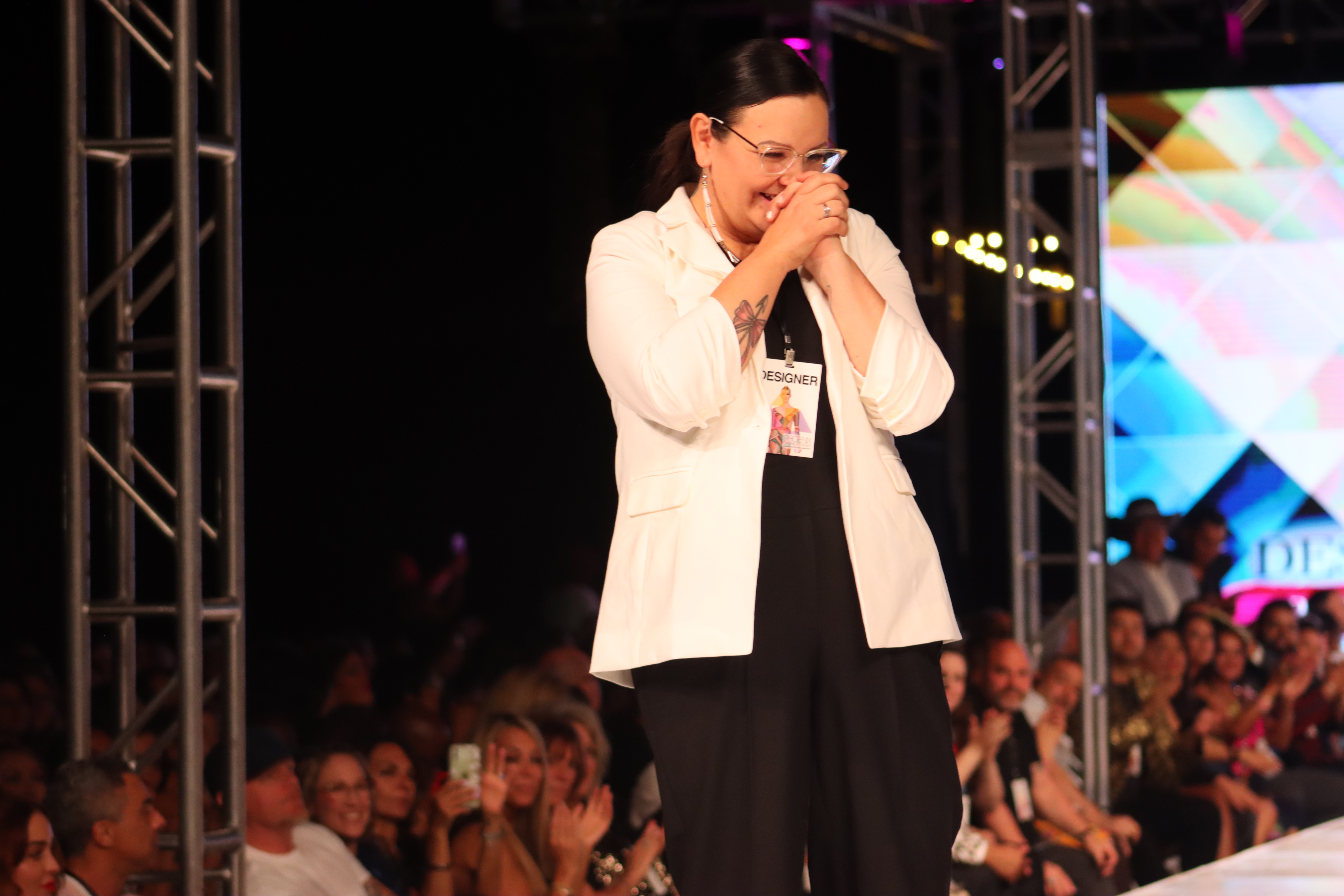
- Details
- By Darren Thompson
PHOENIX—Last night, Norma Baker Flying Horse, founder of Red Berry Woman, was chosen among three other designers as Phoenix Fashion Week’s Designer of the Year at the Chateaux Luxe. She was one of two Indigenous fashion designers chosen by the organization to participate in a 3-month bootcamp that challenged participants with a curriculum designed to advance each designer’s business in the fashion industry.
“I’m beyond happy to receive this recognition,” said Flying Horse to Native News Online. “Thank you to my family, supporters, and the Phoenix Fashion Week for this incredible opportunity.”
As a result of being chosen as Designer of the Year, Flying Horse will be promoted by Agency Arizona, a marquee modeling and talent agency that will promote Red Berry Woman to international markets.
Red Berry Woman is also Norma’s Dakota name, and the business strives to incorporate traditional designs with contemporary couture garments that are ready to wear for both women and men. Norma Baker Flying Horse is an enrolled member of the Hidatsa tribe from the Ft. Berthold Indian Reservation and also Dakota Sioux and Assiniboine. Her clothing and designs pay homage to her cultural heritage. Her opening featured a dance demonstration by fancy shawl and northern traditional buckskin dancers.
Each year, organizers of the popular fashion event travel across the country to search for emerging designers to apply for Phoenix Fashion Week’s challenging 3-month designer bootcamp. This was Phoenix Fashion Week’s first live event since the beginning of the pandemic, more than 2 years ago.
“I’m so proud of her,” said Elmer Flying Horse, Norma’s husband, when Norma was chosen as Designer of the Year. “All of her work and sacrifice was all worth it.” The Flying Horse family drove from the Fort Berthold Indian Reservation in North Dakota during a blizzard that crippled most of the state for several days.
The Phoenix Fashion Week predominantly featured Indigenous culture in this year’s program. Saturday’s opening act Indigenous Enterprise, an Indigenous dance troupe that’s performing at the Met Gala later this year. In 2021, Indigenous Enterprise performed in the “Virtual Parade” for the Presidential Inauguration of Joe Biden.
The Phoenix Fashion Week is a curated two-day event that showcases models, designers, and fashion in the premier fashion event in the Southwest. The organization chose 40 models, female and male, to walk the runway for eight fashion shows a day in the chosen designers’ clothing.
https://nativenewsonline.net/arts-entertainment/norma-baker-flying-horse-phoenix-fashion-week-s-designer-of-the-year#sigProId7c800954b6
This story has been updated to include a quote from the executive director of Phoenix Fashion Week.
More Stories Like This
Two Indigenous Group Exhibits Opening January 9, 2026 at WatermarkWatermark Art Center to Host “Minwaajimowinan — Good Stories” Exhibition
Museums Alaska Awards More Than $200,000 to 12 Cultural Organizations Statewide
Zuni Youth Enrichment Project Takes Top Emerging Artist Apprentices to Phoenix for Artistic Exploration and Cultural Immersion
From Dishwasher to Award-Winning Chef: Laguna Pueblo's Josh Aragon Serves Up Albuquerque's Best Green Chile Stew
Help us defend tribal sovereignty.
At Native News Online, our mission is rooted in telling the stories that strengthen sovereignty and uplift Indigenous voices — not just at year’s end, but every single day.
Because of your generosity last year, we were able to keep our reporters on the ground in tribal communities, at national gatherings and in the halls of Congress — covering the issues that matter most to Indian Country: sovereignty, culture, education, health and economic opportunity.
That support sustained us through a tough year in 2025. Now, as we look to the year ahead, we need your help right now to ensure warrior journalism remains strong — reporting that defends tribal sovereignty, amplifies Native truth, and holds power accountable.
 The stakes couldn't be higher. Your support keeps Native voices heard, Native stories told and Native sovereignty defended.
The stakes couldn't be higher. Your support keeps Native voices heard, Native stories told and Native sovereignty defended.
Stand with Warrior Journalism today.
Levi Rickert (Potawatomi), Editor & Publisher


